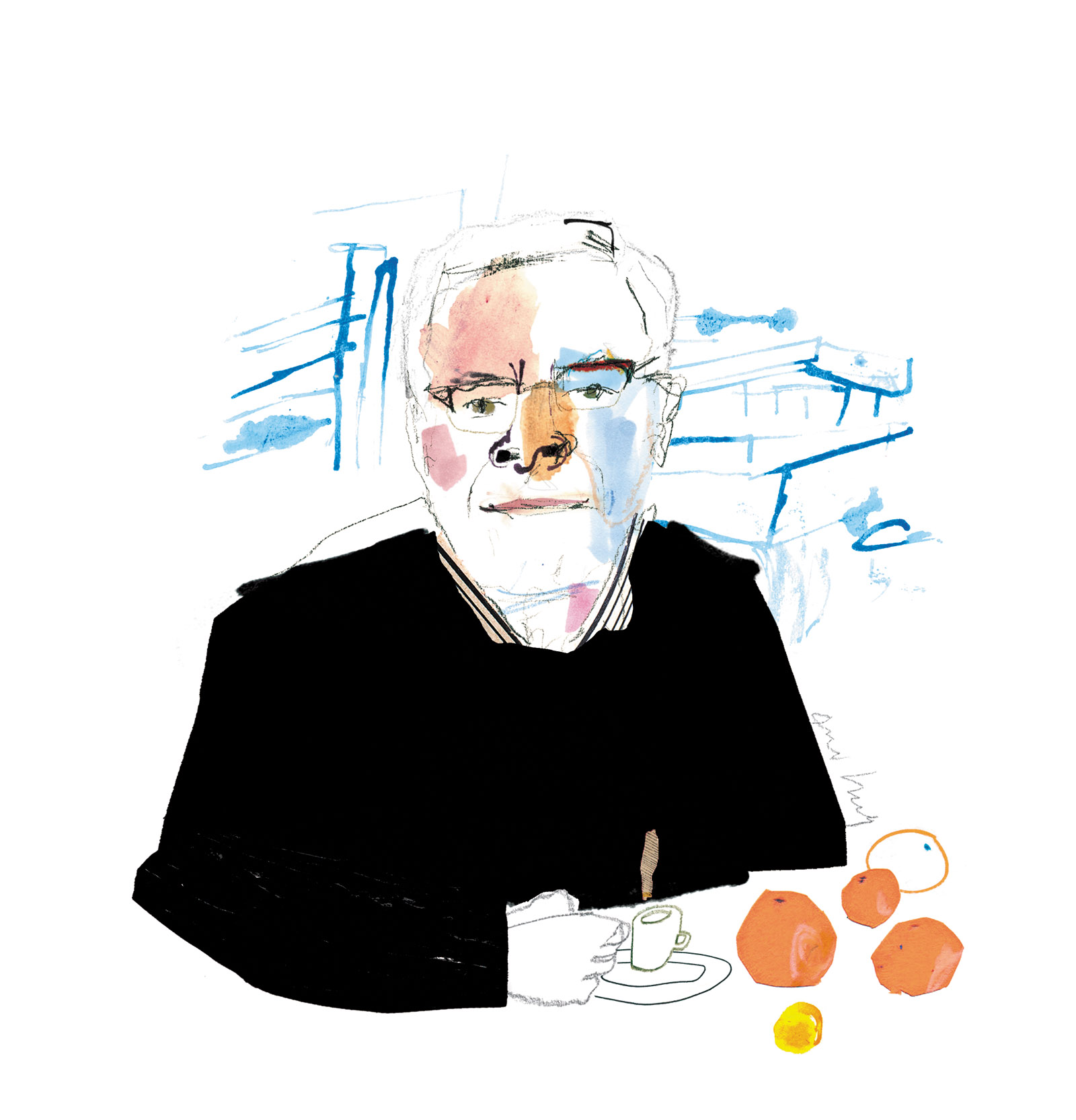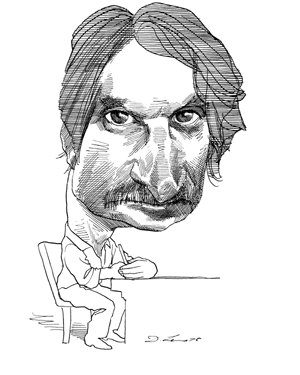“Major American poetry is the best philosophy ever written on this continent,” Marilynne Robinson once wrote. I wonder what John Koethe would say about that. Author of The Continuity of Wittgenstein’s Thought (1996) and Scepticism, Knowledge, and Forms of Reasoning (2005), Koethe was a Distinguished Professor of Philosophy at the University of Wisconsin–Milwaukee until 2010. Yet he is better known for his eleven books of poetry, which have won him many honors, among them the Lenore Marshall Poetry Prize and the Kingsley Tufts Poetry Award. A short book of essays, Poetry at One Remove (2000), makes a brief for the existence of overlapping epistemological aims in some poets (like Wallace Stevens, Elizabeth Bishop, James Merrill, and John Ashbery) and some philosophers (like Plato, Kant, and Thomas Nagel). Yet Koethe steadfastly rejects an easy resolution of his twin vocations, or his double-mindedness: “I have continued to think of my role as a philosopher as a professional and academic one and of the writing of poetry as at some level an essentially gratuitous act.”
“Gratuitous”—in its slightly discordant senses of unwarranted and, etymologically, a gift—suggests that the nature of poetry is essentially free and wayward, in contrast to philosophy, which is labor tightly constrained by rules. If Koethe’s two roles were ever in conflict, it seems to have played out in mid-career when he stopped publishing poems while advancing himself in the academy. After a couple of early books derivative of the New York School, Blue Vents (1968) and Domes (1973, the year he began teaching in Milwaukee), he waited eleven years to publish his third volume, The Late Wisconsin Spring (1984), then another thirteen to publish his fourth, Falling Water (1997). From then onward, there has been an upwelling of verse collections published two, three, but never more than four years apart: The Constructor (1999), North Point North (2002), Sally’s Hair (2006), Ninety-Fifth Street (2009), ROTC Kills (2012), The Swimmer (2016), and now Walking Backwards, which spans fifty years and contains sixteen new poems.
While some may read his meditative, discursive, and resolutely clarifying blank verse as a kind of philosophizing by other means, what Koethe wants to be doing—his interviews and essays testify to this—is shoring up an American tradition of poetic thought that distinguishes those great poets who write sub specie aeternitatis, from the perspective of the “eternal” or objective point of view. The term comes from Spinoza but the idea is also present in Plato’s forms, Kant’s metaphysical sublime, and Nagel’s “view from nowhere.” In a prefatory poem, an ars poetica written to launch this chronological selection, Koethe unabashedly takes us back to where it all began: “Yeats and Frost, Pound and Eliot,/Stevens, Moore, seen as from a peak in Darien in a college course.” What flows forward from this backward-looking poem is an evolving, cohering, always-recapitulating testament to an inner life torn between the perspectives of a fundamentally Romantic poet and a philosophically “die-hard realist.”
John Koethe was born in 1945 in San Diego, raised there first as a Catholic, then, after his mother’s conversion, as a Lutheran. His father was in the Navy and a former concert violinist; Koethe himself took piano lessons as a kid (from Dave Brubeck’s brother, we learn in one poem), but what he was really interested in was math and physics. As an undergraduate at Princeton he fell in with his generation of poets in New York and discovered both literature and philosophy. He took a Ph.D. in the latter at Harvard before embarking on his teaching career at Milwaukee. These and other facts about his life—travel, marriage, divorce, flings, a son raised and launched—can be gleaned from his verse, but briefly and almost incidentally; they vouch for Koethe’s Everyman status and establish him as a specimen of humanity no more rarefied than the next thoughtful Homo sapiens (a placid, middle-aged, middle-class existence in the American Midwest is used to advantage).
The inquiry into the difference between particulars and types is one of the philosophical wellsprings of Koethe’s poetry, generating a tone of frank doubt about the value of anything any particular man does—including writing verse. But by conjuring the multiplicity of poets who wrote before him, he asserts a faith in the collective language of English lyric, finding in it something more lasting, if not universal. Take “Sunday Evening,” the first poem in The Constructor:
Ideas as crystals and the logic of a violin:
The intricate evasions warming up again
For another raid on the inarticulate. And soon
The morning melody begins, the oranges and the tea,
The introspective walk about the neighborhood….
In a poem dense with allusions to the Modernist canon, it’s hard to know where to begin: with the title perhaps, which is bland enough to escape detection as a détournement of Wallace Stevens’s classic “Sunday Morning.” Or the first line, which mimics that poem’s opening (“Complacencies of the peignoir, and late/Coffee and oranges in a sunny chair”), which the fourth line will more explicitly echo, but not before snatching a line from T.S. Eliot’s “East Coker,” establishing a very close tonal register for the entire poem.
Advertisement
Eliot’s discursive tone, and recursive grammar, were appropriated by his greatest successor, John Ashbery, in the period spanning books from Rivers and Mountains to A Wave, and Koethe follows Ashbery in following Eliot (Koethe writes extensively about Ashbery in Poetry at One Remove). As “Sunday Evening” progresses, though, the echoes of “Sunday Morning” grow louder, and then, astonishingly, Yeats comes into the mix:
To hesitate, to brood, to linger in the library and then,
As from some green and sunny chair, arise and go.
That touch of “The Lake Isle of Innisfree” may be surprising, but it is not arbitrary: all three touchstones in this poem so far (and we’re only eleven lines in) have to do with paradises envisioned and lost and only really achieved in the losing (if Proust comes to mind, hold that thought). The questions Koethe poses reiterate the rhetorical questions Stevens asks throughout “Sunday Morning”:
Is this
How heaven feels? The same perspective from a different room,
Inhabiting a prospect seen from someone else’s balcony
In a suspended moment—as a silver airplane silently ascends
And life, at least as one has known it, slides away?
And then Koethe quotes from Stevens’s “dark/Encroachment of that old catastrophe” as well as Eliot’s elegaic “The Love Song of J. Alfred Prufrock”:
I thought that people understood these things.
They show the gradual encroachment of a vast,
Impersonal system of exchanges on that innermost domain
In which each object meant another one, all singing each to each
In a beautiful regress of forgetting.
The poem goes on in this manner, sampling the words of Eliot, Stevens, and Yeats for forty-nine lines to yield a harmonious ensemble, as close to a chorale as lyric poetry gets, ending with a mash-up of the final stanza of “Sunday Morning” and Innisfree’s bees:
Infinitely far away,
One almost seems to hear—as though the fingers of a solitary giant
Traced the pure and abstract schema of those strings
In a private movement of delight—the soundless syllables’
Ambiguous undulations, like the murmur of bees.
By no means are Koethe’s poems always this intertextual. But “Sunday Evening” is exemplary in the way that it posits an almost authorless text, written by the canon itself, in the guise of one man’s soliloquy. If he is treading dangerously close to pastiche, it is in the manner of his New York School predecessors like Ashbery, Frank O’Hara, and Kenneth Koch, who sampled canonical lines by poets from Andrew Marvell to William Carlos Williams.
This is in line with Koethe’s own creed, expressed in interviews and in his essays, that poetry in its fullest capacity takes a view beyond the personal:
Each of us has a “personal” perspective on his or her own life, from which we can’t help but regard that life and its interests and concerns with tremendous seriousness; and which invests them with an importance informing almost every aspect of our deliberation and practical reasoning. Yet each of us is also capable of self-awareness and of mentally “stepping back” and regarding that life and its concerns from an impersonal perspective, sub specie aeternitatis—a perspective from which those concerns seem to have no real importance or significance at all.
It should go without saying that the perspective of sub specie aeternitatis has been a feature of poetry, and not just Western poetry, since we first started saving the poems of the dead. In the process of literary evolution, it makes sense to give preference to works that speak beyond the constraints of time and place. Yet at least since Robert Lowell’s “why not say what happened?” (the pithiest brief for confessional poetry)—or Adrienne Rich’s recounting, in her landmark essay “When We Dead Awaken,” of her own shucking off of universalist ideas in a quest to write as a feminist—American poetry has shied away from the impersonal. The great exception has been Ashbery, which is one reason why Koethe takes so much solace from him. Koethe’s quotations speak to a desire to populate the terrain.
Incidentally, it isn’t possible to read “Sunday Evening” as purely objective poetry—detached from personal concerns—if you look at it as an opening elegy in a book that deals obliquely with the dissolution of a long marriage. That poem circumambulates a lost paradise, after all, and will resonate with anyone who has reached a certain age and made a bit of a mess of things. There is a glitch in Koethe’s chronology around this time: as mentioned, he was silent for thirteen years after the publication of The Late Wisconsin Spring, the first book of his maturity. When he broke his silence, it was with Falling Water in 1997; The Constructor was published in 1999, but Koethe has specified that the later book was written first. In a book titled Walking Backwards, it is curious that two books in the middle—or apex—of his career are reversed, and that (according to his interviews) the title poem of The Constructor was actually written backward, from the last line. It was also around this time that Koethe started folding in references to Proust, as in the title poem of Falling Water, in which the mourning for his marriage is most acute:
Advertisement
Two years ago we took our son to Paris. Last night
I picked him up and took him to a Lou Reed show,
And then took him home. I look at all the houses as I
Walk down Hackett Avenue to work. I teach my classes,
Visit friends, cook introspective meals for myself,
Yet in the end the minutes don’t add up. What’s lost
Is the perception of the world as something good
And held in common; as a place to be perfected
In the kinds of everyday divisions and encounters
That endowed it with integrity and structure,
And that merged its private moments with the past.
What broke it into pieces? What transformed the
Flaws that gave it feeling into objects of a deep and
Smoldering resentment—like coming home too early,
Or walking too far ahead of you on the rue Jacob?
In the middle of a long meditative poem that takes as its central metaphor the Frank Lloyd Wright house cantilevered over a waterfall (think of Heraclitus’s river or Keats’s epitaph), this passage departs from the sub specie aeternitatis to embrace the fine-grained particulars of a life with heartrending bewilderment. We know “les vrais paradis sont les paradis qu’on a perdus,” but the stoic treatment gets me every time.
What will keep me returning to this book is not so much its elegaic quality as its formal beauty. As you may imagine from an author who titles his works Falling Water and The Constructor, Koethe is partial to architectural metaphors. He gravitates to the decasyllabic blank verse mode, but the fairly rare rhyming poems are exhilarating departures, as in “What the Stars Meant”:
On a backwards-running clock in Lisbon,
By the marble statue of Pessoa;
On an antique astrolabe in London
Tracing out the sky above Samoa,
Thousands of miles away—in time, in place,
Each night conspires to create a myth
That stands for nothing real, yet leaves you with
The vague impression of a human face.
The fragments fly apart and shift, trembling
On the threshold of a kind of fullness:
The minor wonder of remembering;
The greater wonders of forgetfulness.
This aphoristic mode suits Koethe, and the spectacle of his typically long recursive sentences—winding themselves around the spindle of a rhyme scheme, parceled into quatrains, or cantilevered, as it were, clause by clause over vistas it would seem impossible to put into words—gives me a deep pleasure, as do his ambiguous endings that militate against the tidy closures afforded by forms:
In
The wide, unstructured heavens overhead
The stars were still shining. When I got home,
The message light was blinking on the phone.
I don’t remember what the message said.
“The Proximate Shore” is another rhyming poem that recalls the ars poetica at the start of the book, but is stronger for its terza rima. One thing that rhyme does is force habitual thinking off its rails, and Koethe, who can sound like he knows too well what he wants to say, is pressed by rhyme to utterances that the words require:
Poems are the fruit of the evasions
Of a life spent trying to understand
The vacuum at the center of the heart,
And for all the intricate persuasions
They enlist in the service of their art,
Are finally small, disappointing things.
Yet from them there materializes
A way of life, a way of life that brings
The fleeting pleasures of a vocation
Made up of these constant exercises
In what still passes for celebration,
That began in a mood of hopelessness
On an evening in a dormitory
Years and years ago, and seemed to promise
A respite from disquietude and care,
But that left only the lovely story
Of a bright presence hanging in the air.
Surely there is no better recapitulation of Alasdair MacIntyre’s argument that practice begets virtue begets happiness, nor any better deflation of the romantic aspect of that promise of happiness. That would be Koethe in a nutshell: insisting, as in “Falling Water,” that “the most important thing is human happiness” but also that such happiness is a bit of a canard. “‘Mellow’/Is a word for disappointed,” he remarks late in “ROTC Kills,” another backward-looking poem. And yet, when he gives in to his romanticism, the lyric extravagance is pure pleasure, a specifically poetic pleasure understood, appreciated, and undisputed, except by those who have found ways to write without that gift.
The late works of Koethe grow chattier, unafraid of the petty anecdote or sublunary detail (“since our stories all sound alike,/With nothing to reveal or hide,” he writes in “The Sin of Pride”). The subject matter broadens, becomes occasional; he may recap movies that have been important to him, or recount the suppressed history of the Tulsa race riot. The repetitive insistence on youth’s romanticism as an illusion, but one that has yielded a not-infelicitous, moderate bounty in old age, is redeemed mainly by his eloquence, and by the echoes of those poets he draws in for comfort: not only Stevens and Eliot and Ashbery, but also Auden and Larkin, Moore and Bishop and Dickinson.
Sometimes I thought, while reading the new poems, that Koethe is a little too eloquent, having come to definite conclusions about “being” and only needing a new way of saying it. Or that he has perhaps made peace with life too well to sustain poetry’s quarrel with himself. Confronting the bestial news cycle in “The Violet Hour” or bad contemporary poetry in “The Reluctant Elegist,” Koethe can seem complacent or crabby—and then I thought of the judgment of one philosopher, Hannah Arendt, on Auden:
What made him a poet was his extraordinary facility with and love for words, but what made him a great poet was the unprotesting willingness with which he yielded to the “curse” of vulnerability to “human unsuccess” on all levels of human existence—vulnerability to the crookedness of the desires, to the infidelities of the heart, to the injustices of the world.
That is, Auden never drew a curtain over his desire to be loved, or his hurt when the world failed to be good. That as unsentimental a person as Arendt could praise this suggests that a philosophical perspective doesn’t have to mean resignation to things as they are.




